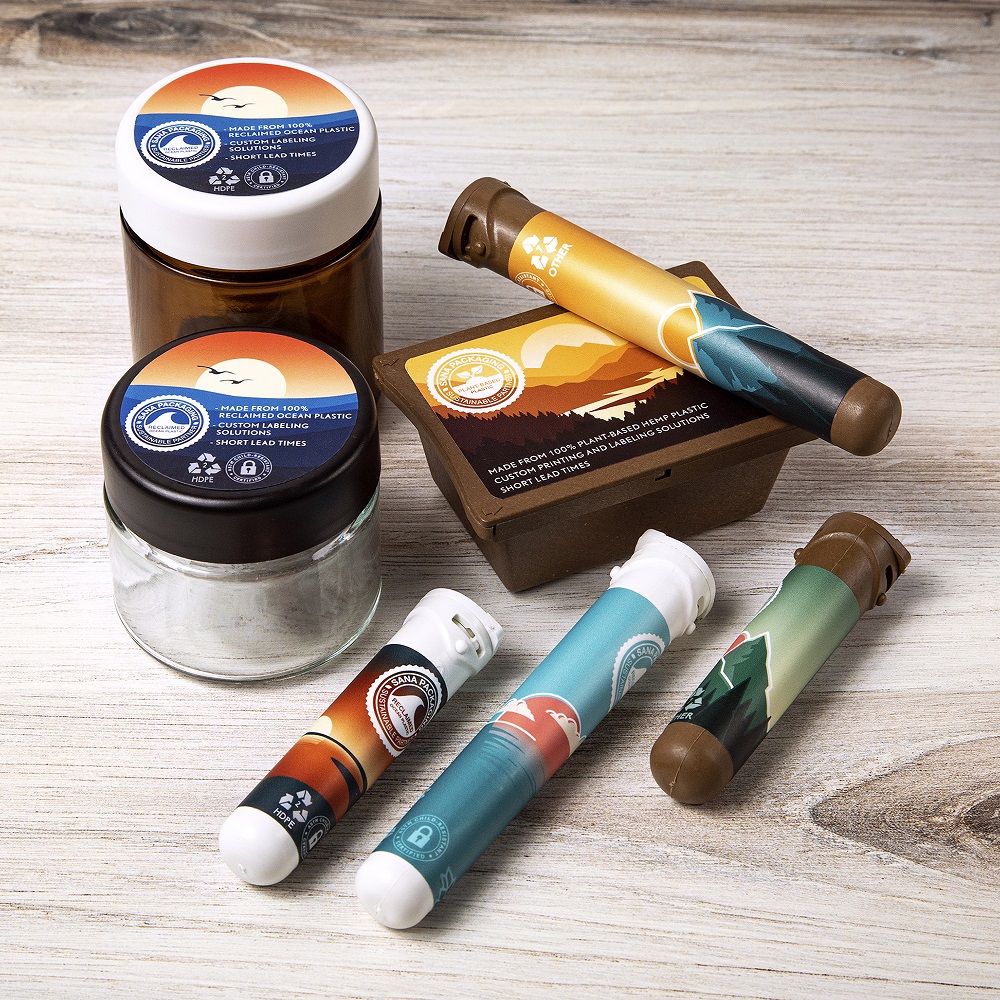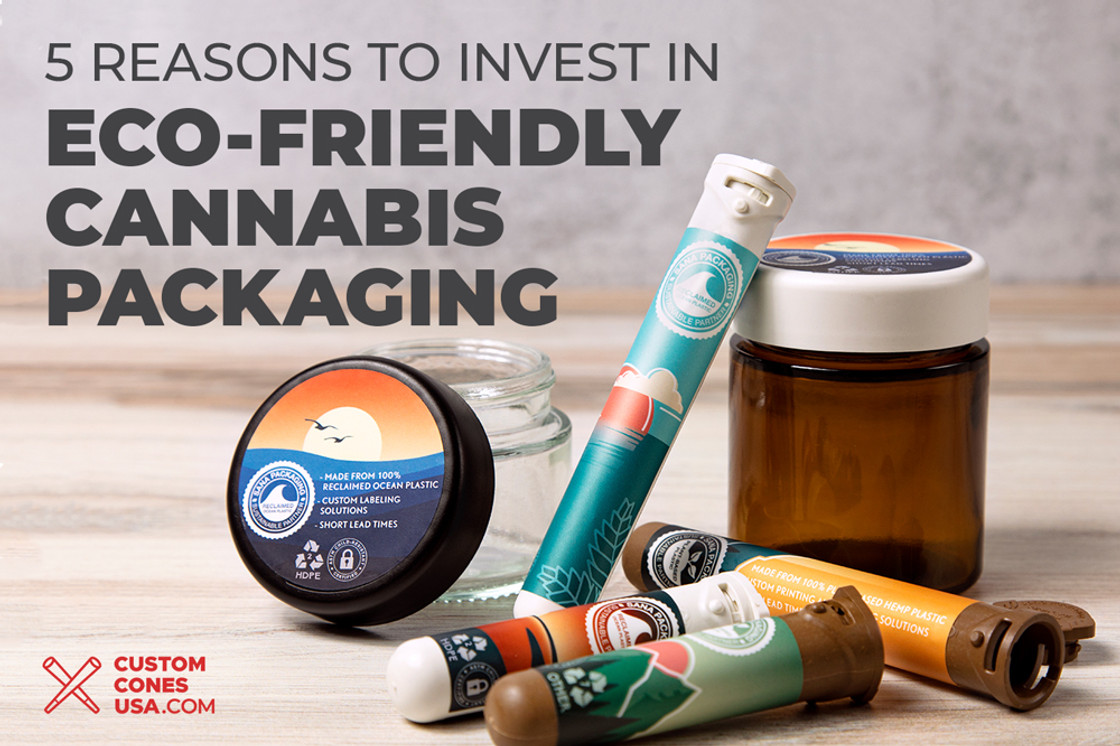Reasons to Invest in Eco-Friendly Cannabis Packaging
Posted by Custom Cones USA on Jun 24th 2021
Cannabis users have a complicated relationship with recreational marijuana packaging. For a fleeting moment, it’s the allure, the enticement—the brightly colored chariot bringing a new, intoxicating cannabis flavor into their lives. But then, suddenly, when the bowl is out and the pre-roll has been snuffed, we couldn’t care less about the packaging. Into the garbage it goes; never to be seen again. However, that has created a whole new problem with an alarming environmental cost.
Single-use plastic packaging is literally piling up.
The growth in the use of plastic products in the last 50 years has been extreme. Simply put, people and businesses just can’t seem to kick their addiction to this cheap, durable material. As a planet, we produce tons and tons of plastic every year, and scientific reports say that as much as 50 percent is for single-use purposes – used for just a short time and then thrown away. While paper and food products can decompose in a matter of months, if not weeks; plastics take up to 450 years to decompose.
As our global plastic problem mounts, customers (and therefore businesses) have been slow to change. According to the United Nations Environment Programme (UNEP), consumers are “concerned about plastic waste, but are not changing habits. While 91 percent of consumers state that they are concerned about plastic waste issues, fewer than half are less likely to buy a product from non-recycled material.”
Consumers’ focus on recycling is increasing, however. While only 54 percent of consumers are recycling and converting their plastic waste into useful products, 38 percent have only indicated their intent to do so in the next 12 to 18 months, according to the UNEP. The main issue here, though, is that only 9 percent of all recycled materials are actually recycled into new products.
Today, the cannabis pre-roll industry is dominated by single-use plastic tubes, known as “doob tubes”, which house single joints for smokers on the go. According to a recent survey of more than 130 pre-roll businesses conducted by Custom Cones USA, 63.6 percent of respondents said they use single-use plastic as their primary form of pre-roll packaging.
Customers want eco-friendly cannabis brands.

For this reason, some cannabis pre-roll customers are searching for brands that speak to their environmentally conscious values. Similarly, more and more companies are infusing their brands with an eco-minded ethos that removes any sense of buyer’s remorse for regularly contributing to an already out-of-control pollution problem through the use of sustainable packaging and business practices.
Knowing what your brand is and who your customers are has never been more important because the customers are lining up and business is booming. In 2020, pre-roll sales in recreational U.S. cannabis markets saw 59% year over year growth with total sales increasing from $704M in 2019 to $1.12B in 2020. This growth in pre-roll sales outpaced the total market, which grew by 54.2% over the same period, according to data from Headset, a Seattle-based cannabis analytics firm.
Here at Custom Cones USA, we are a one-stop shop for all things pre-roll and we can safely say that plastic tubes are always the first choice in cannabis packaging. They are cheap and easy to get, which helps brands get to market more quickly.However, as the legal pot scene matures, we have seen considerable growth in eco-friendly cannabis packaging because the cannabis marketplace has evolved to a point where consumers are demanding more environmentally conscious options, so brands are gearing up to meet that demand.
You don’t have to sacrifice compliance for sustainability.
Since marijuana is not legal at the federal level, there is a patchwork landscape of cannabis packaging rules across the United States. For example, according to California regulations, which were codified in Proposition 64, the law that legalized adult-use cannabis in the state, there are different labeling rules for cannabis flower versus what it considers “manufactured” products, like cannabis edibles, topicals, and concentrates. Rules change by the state but depending on where you are, your packages may need to be child resistant, tamper evident, resealable, and/or opaque.

In a 2020 Healthline article, Jed McWhorter, director of purchasing at Curaleaf, the world’s largest cannabis company, said unfortunately, many state packaging requirements lead to a lot of single-use plastics within the industry. “For example, many states require child-resistant packaging, which requires an additional layer of plastic across the entire supply chain,” McWhorter said.
As a rule, we believe that companies shouldn’t have to choose between compliance and sustainability, which is why we are working with several partners to bring functional, eco-friendly cannabis packaging into the mainstream. Brands using sustainable packaging still have to pass compliance standards in their states, so we have options that will work for any business because the packaging can be as eco-friendly as you want, but if companies can’t use it, then it’s no good.
As a business, you get to walk your talk.
One of our partners in the sustainable cannabis packaging space is Sana Packaging. James Eichner, co-founder of Sana Packaging, said the company started as a grad school project, which garnered a lot of good feedback from their professors and peers. Around graduation time, James and his partner applied to CanopyBoulder, an accelerator and venture capital fund for the legal cannabis industry. Since going through the accelerator program in 2017, Sana Packaging has developed two lines of eco-friendly packaging: plant-based hemp plastics and reclaimed ocean plastics.
Tons of cannabis plastics enter our landfills and oceans every year, Eichner said, so from the beginning, Sana’s goal has been to change the way the cannabis industry thinks about sustainability, disposable products, and waste recovery.
Eichner said hemp is both sustainable and regenerative, plus it requires less water to grow than industrial crops and none of the pesticides. The reasons for leveraging reclaimed ocean plastics should be obvious, but Eichner said it’s all about getting it out and reintroducing it to the marketplace. “There is simply no reason to use virgin petroleum-based resins, especially for single-use products, like packaging,” he said.
Customers will reward you for your investments.

A lot is made these days regarding home recycling and a person’s carbon footprint on the planet. However, Eichner said this idea fundamentally puts the responsibility for dealing with single-use plastics on the shoulders of consumers. “Why should it be on us to take responsibility for the consequences of choices made by large corporations and businesses,” Eichner said. “It’s time for companies to step up and take responsibility by making more sustainable packaging choices.”
Another Custom Cones USA partner and sustainable packaging advocate, Jason Lammers, said he understands the pressure on businesses to deliver profits before anything else. “Most businesses aren’t huge corporations and the margin on some cannabis products can be razor slim to stay competitive, so it can be extremely difficult for companies to do the right thing,” Lammers said.
Lammers hasn’t always been part of the solution, though. He said his company was bringing over 40-foot container ships filled with single-use plastic joint tubes from China on a regular basis when they first got started. “I was seeing first-hand that I was part of the problem,” he said.
Since then, his company has invested in an injection mold that produces joint tubes made from recycled plastics here in the USA, which also cuts down on transportation impacts and cost. “Every business in the cannabis industry needs to consider sustainability and their impacts on the planet if they can afford it,” Lammers said.
Ultimately, it really all comes down to the customers. Lammers said that if the majority of customers demand more environmentally conscious and sustainable packaging, then packaging companies will respond in kind. “As a country we have seen a big shift toward sustainability as a focus,” Lammers said. “That allows us to shift because consumers are starting to demand it.”
The growth in the use of plastic products in the last 50 years has been extreme. Simply put, people and businesses just can’t seem to kick their addiction to this cheap, durable material.










